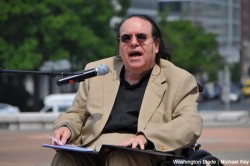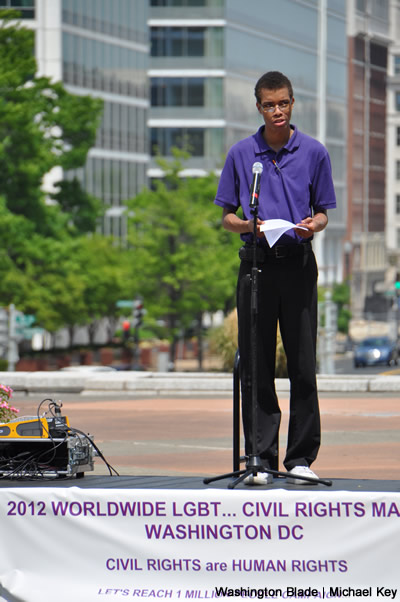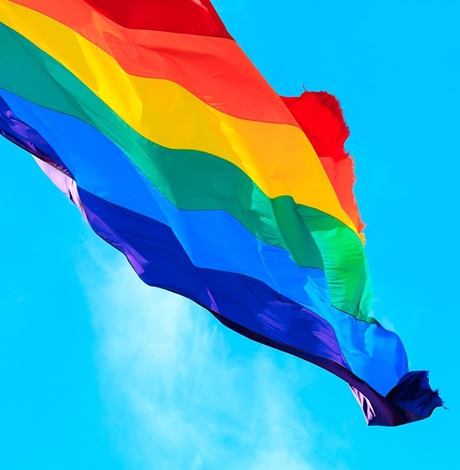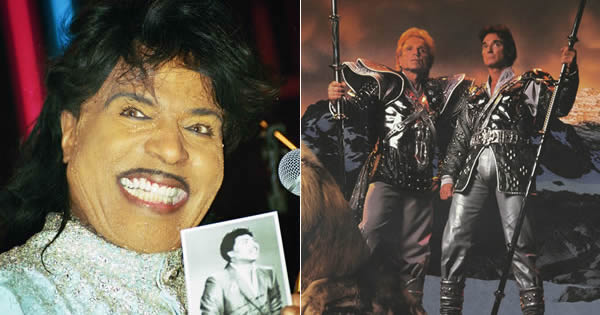Local
‘Worldwide’ LGBT marches fizzle
Only 14 demonstrators turn out in D.C.
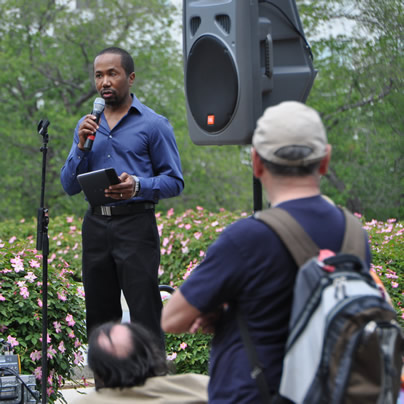
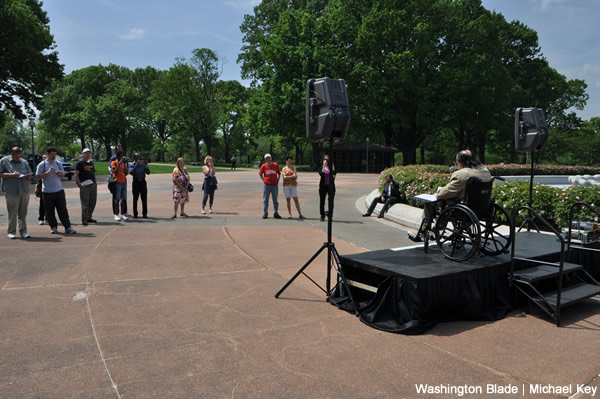
Lack of turnout for the local DC component of the 'worldwide' equality march led to the cancelation of the rally's march portion. (Washington Blade photo by Michael Key)
Saying they were unwavering in their commitment to LGBT equality, a contingent of 14 LGBT activists and their straight supporters held a rally across the street from the U.S. Capitol early Saturday afternoon as part of a series of Worldwide LGBT Civil Rights marches in the U.S. and abroad.
The event was promoted mostly on Facebook without the involvement of established local and national LGBT organizations. It was the brainchild of Oklahoma City gay activist Joe Knudson, who called for a series of simultaneous LGBT marches and rallies in cities throughout the world on April 21.
With less than 20 participants present at the conclusion of the rally, organizers chose to forego the march.
“These marches are occurring in over thirty cities around the globe,” said Curtis Sledge, a Richmond, Va., gay activist who organized the D.C. event and was among three speakers at the rally held at Upper Senate Park.
“Regardless of the size of the crowd…we’re here to say it’s our time right now,” Sledge said after the rally. “We are seeking equality not just for us but for everyone.”
The organization Let’s Reach One Million People Campaign, through which Knudson and others worked to organize the marches and rallies, listed 18 U.S. cities and 12 cities in countries in Europe, Asia and Africa where marches were scheduled to take place. It could not be determined at press time whether all of them took place, especially those in Africa.
According to reports in the gay and straight media, marches or rallies in most of the U.S. cities where they took place drew fewer than 100 people. The LGBT newspaper George Voice reported about 50 turned out for a rally and march on the state capital in Atlanta.
The Athens, Ga., Banner-Herald reported that about 75 people turned out for a march in that Georgia city, which was covered by the straight press. In Chicago, about 15 people participated in a March and rally and about 30 turned out for the march and rally in Portland, Ore., according to a report by the LGBT blog Bilerico Project.
In a statement released to organizers and supporters of the events, Knudson said between 6,000 and 8,000 people participated in the events in the U.S. and overseas. He said the enthusiasm and impact the events would have in the U.S. and abroad would be far more significant than the number of people attending them.
Jonathan Wolfman, a writer, former teacher and chief editor of an online travel site called CastleGayGuide.com, gave the keynote speech at the D.C. rally. Describing himself as a straight ally to the LGBT movement, Wolfman called LGBT rights “the essential civil rights mandate of our era.”
He noted that in addition to rallies and marches in the U.S., many of the LGBT events were scheduled to take place overseas, including such countries as Uganda, Nigeria, and Pakistan.
“That some are marching today in several of those nations takes guts and a belief in ultimate justice,” he said. “I salute all marchers today but especially those who risk arrest and beatings and worse for their commitment.”
Lamel Clark, 21, a Richmond resident, told the rally the 1960s era black civil rights movement was his inspiration for becoming involved in the LGBT movement as an African American gay man.
“Many years ago a great man stood on the steps of the Lincoln Memorial and spoke of a dream. He dreamed of a day when people could be treated equally and not judged by the color of their skin,” said Clark, speaking on a stage next to a fountain and facing the Capitol Building.
“I’m proud to stand not too far from where he was and know that his dream was a reality,” he said. “But today I stand before you with a dream of my own. I dream of a day when I can have the option to marry whoever I please and not have to worry about their sex but to be able to marry just on the basis of love.”
Clark added, “I stand here because I have found the person who I want to spend the rest of my life with. So many people have told me, oh, it’s o.k. You don’t have to be married to spend the rest of your life with someone. My response is that’s not enough…I want to say loud and proud this is my husband.”
Among those standing nearby listening to Clark and the other two speakers were two U.S. Capitol police officers. The two likely were assigned to patrol a rally and parade that organizers stated in their application for a parade permit was expected to attract between 1,500 and 2,500 people.
Sledge said he was at a loss to say why so few people attended. He said he contacted a number of local organizations as well as several D.C. area universities about the planned march and rally. According Sledge, a Facebook page promoting all of the planned U.S. Worldwide March events had more than 20,000 members.
He said a number of people who told him they planned to attend D.C. rally didn’t show, including D.C. gay activist Brian Watson, who was listed as a scheduled speaker.
Watson did not return calls seeking to confirm whether he agreed to speak at the event.
When asked why he thought most of the established U.S. national and local LGBT organizations chose not to participate in the marches, Knudson said sources familiar with various groups told him the groups don’t like to get involved in events that they don’t control.
“I was point blank told by some that it is not proper for a new and young grassroots organization such as the Let’s Reach 1 Million People Campaign, to initiate such action as we did without first getting the approval of some of the older more established organizations,” Knudson told the Blade.
“[I]n doing so we stepped on a lot of egos and I was told egos of LGBT organizations do not heal very well or very fast,” he said.
Veteran D.C. gay activists Bob Summersgill, former president of the Gay and Lesbian Activists Alliance, and Rick Rosendall, the group’s current vice president, disagreed with Knudson’s assessment of the established LGBT groups.
“Speaking for myself and GLAA, if we were so egotistical and controlling as Mr. Knudson says in his laughable generalization, we wouldn’t have the record of accomplishment that we do,” Rosendall said. “LGBT advocates in D.C. have a long history of coalition work, which is not about getting permission but about consultation.”
Summersgill said organizers of the worldwide marches didn’t adequately communicate what they wanted people to do to advance their goals of equality “other than to walk around while members of Congress were out of town.”
In addition to granting permission to hold the rally on U.S. Capitol grounds, the permit called for a march from the Capitol along Constitution Avenue to 15th Street, N.W., where it was to travel north and turn right on Pennsylvania Avenue and head back towards the Capitol. The march was scheduled to end at 3rd Street and Pennsylvania Avenue, N.W.
Wolfman, a Maryland resident, gave a ringing defense of same-sex marriage and needled opponents who say same-sex nuptials are a threat to the institution of marriage.
“This may be the most ludicrous idea going,” he said. “Encouraging marriage simply encourages marriage. It is impossible to see how the gay marriage next door threatens my straight marriage. It is equally impossible to understand how the legalization of gay marriage could possibly convince straight people not to marry or encourage them to split up.”
Sledge said in his speech that the LGBT rights movement has picked up considerable momentum over the past few years. Among the work still to be done in the U.S., he said, was the eradication of bullying and other forms of discrimination against LGBT youth.
“Never for a moment those of you in the gay community – never for a moment look on yourself as being inferior or less than human but stand tall with your heads held high as a person with a heart, with talent and significance in this world,” he said.
“And for all this we should be accepted for being what God created. Equality is our birthright. We are equal.”
Maryland
Md. Commission on LGBTQIA+ Affairs released updated student recommendations
LGBTQ students report higher rates of bullying, suicide

The Maryland Commission on LGBTQIA+ Affairs has released updated recommendations on how the state’s schools can support LGBTQ students.
The updated 16-page document outlines eight “actionable recommendations” for Maryland schools, supplemented with data and links to additional resources. The recommendations are:
- Developing and passing a uniform statewide and comprehensive policy aimed at protecting “transgender, nonbinary, and gender expansive students” against discrimination. The recommendation lists minimum requirements for the policy to address: name, pronoun usage, and restroom access.
- Requiring all educators to receive training about the specific needs of LGBTQ students, by trained facilitators. The training’s “core competencies” include instruction on terminology, data, and support for students.
- Implementing LGBTQ-inclusive curricula and preventing book bans. The report highlights a “comprehensive sexual education curriculum” as specifically important in the overall education curriculum. It also states the curriculum will “provide all students with life-saving information about how to protect themselves and others in sexual and romantic situations.”
- Establishing Gender Sexuality Alliances “at all schools and in all grade levels.” This recommendation includes measures on how to adequately establish effective GSAs, such as campaign advertising, and official state resources that outline how to establish and maintain a GSA.
- Providing resources to students’ family members and supporters. This recommendation proposes partnering with local education agencies to provide “culturally responsive, LGBTQIA+ affirming family engagement initiatives.”
- Collecting statewide data on LGBTQ youth. The data on Maryland’s LGBTQ youth population is sparse and non-exhaustive, and this recommendation seeks to collect information to inform policy and programming across the state for LGBTQ youth.
- Hiring a full-time team at the Maryland Department of Education that focuses on LGBTQ student achievement. These employees would have specific duties that include “advising on local and state, and federal policy” as well as developing the LGBTQ curriculum, and organizing the data and family resources.
- Promoting and ensuring awareness of the 2024 guidelines to support LGBTQ students.
The commission has 21 members, with elections every year, and open volunteer positions. It was created in 2021 and amended in 2023 to add more members.
The Governor’s Office of Communication says the commission’s goal is “to serve LGBTQIA+ Marylanders by galvanizing community voices, researching and addressing challenges, and advocating for policies to advance equity and inclusion.”
The commission is tasked with coming up with yearly recommendations. This year’s aim “to ensure that every child can learn in a safe, inclusive, and supportive environment.”
The Human Rights Campaign’s most recent report on LGBTQ youth revealed that 46.1 percent of LGBTQ youth felt unsafe in some school settings. Those numbers are higher for transgender students, with 54.9 percent of them saying they feel unsafe in school.
Maryland’s High School Youth Risk Behavior Survey reveals a disparity in mental health issues and concerns among students who identify as LGBTQ, compared to those who are heterosexual. LGBTQ students report higher rates of bullying, feelings of hopelessness, and suicidal thoughts. Nearly 36 percent of LGBTQ students report they have a suicide plan, and 26.7 percent of respondents say they have attempted to die by suicide.
The commission’s recommendations seek to combat the mental health crisis among the state’s LGBTQ students. They are also a call for local and state governments to work towards implementing them.
Virginia
Va. lawmakers consider partial restoration of Ryan White funds
State Department of Health in 2025 cut $20 million from Part B program

The Virginia General Assembly is considering the partial restoration of HIV funding that the state’s Department of Health cut last year.
The Department of Health in 2025 cut $20 million — or 67 percent of total funding — from the Ryan White Part B program.
The funding cuts started with the Trump-Vance administration passing budget cuts to federal HIV screening and protection programs. Rebate issues between the Virginia Department of Health and the company that provides HIV medications began.
Advocates say the funding cuts have disproportionately impacted lower-income people.
The Ryan White HIV/AIDS Program, a federal program started in 1990, provides medical services, public education, and essential services. Part B offers 21 services, seven of which remained funded after the budget cuts.
Equality Virginia notes “in 2025, a 67 percent reduction severely destabilized HIV services across the commonwealth.”
Virginia lawmakers have approved two bills — House Bill 30 and Senate Bill 30 — that would partially restore the funding. The Ryan White cuts remain a concern among community members.
Both chambers of the General Assembly must review their proposed changes before lawmakers can adopt the bills.
“While these amendments aren’t a full restoration of what community-based organizations lost, this marks a critical step toward stabilizing care for thousands of Virginians living with HIV,” said Equality Virginia Executive Director Narissa Rahaman. “Equality Virginia plans to continue their contact with lawmakers and delegates through the conference and up until the passing of the budget.”
“We appreciate lawmakers from both sides of the aisle who recognized the urgency of this moment and will work to ensure funding remains in the final version signed by the governor,” added Rahaman.
District of Columbia
D.C. Black Pride theme, performers announced at ‘Speakeasy’
Durand Bernarr to headline 2026 programming

The Center for Black Equity held its 2026 DC Black Pride Theme Reveal event at Union Stage on Monday. The evening, a “Speakeasy Happy Hour,” was hosted by Anthony Oakes and featured performances by Lolita Leopard and Keith Angelo. The Center for Black Equity organizes DC Black Pride.
Kenya Hutton, Center for Black Equity president and CEO, spoke following the performances by Leopard and Angelo. Hutton announced this year’s theme for DC Black Pride: “New Black Renaissance.”
Performers for 2026 DC Black Pride were announced to be Bang Garcon, Be Steadwell, Jay Columbus, Bennu Byrd, Rue Pratt and Akeem Woods.
Singer-songwriter Durand Bernarr was announced as the headliner for the 2026 festivities. Bernerr gave brief remarks through a video played on the screen at the stage.
DC Black Pride is scheduled for May 22-25. For more information on DC Black Pride, visit dcblackpride.org.

